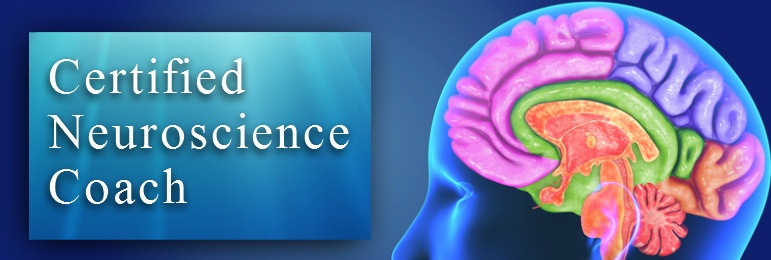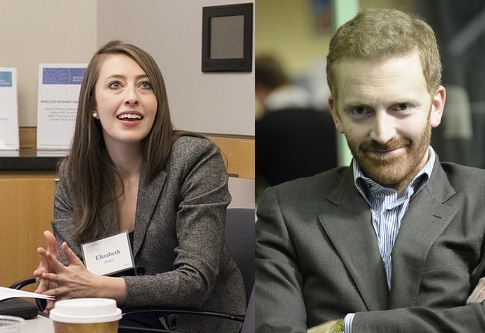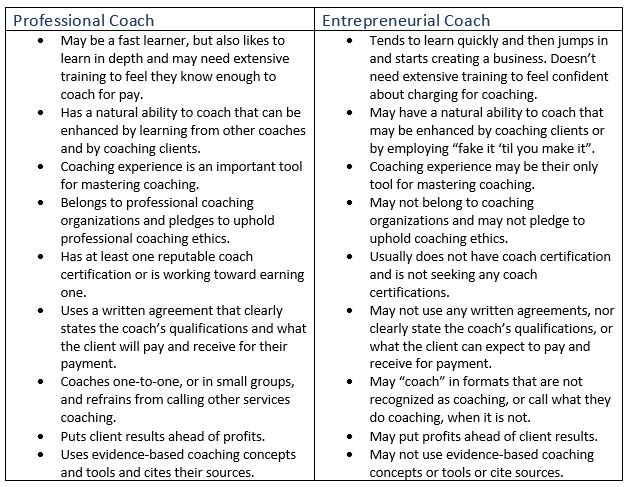 Do you want to know how to become a life coach? Here’s a quick story that illustrates the experiences of many of the thousands new coaches that I’ve taught, coached, or talked to over the past few years. It shows how to become a successful life coach. Maybe it will help you decide what path to take.
Do you want to know how to become a life coach? Here’s a quick story that illustrates the experiences of many of the thousands new coaches that I’ve taught, coached, or talked to over the past few years. It shows how to become a successful life coach. Maybe it will help you decide what path to take.
I call it: A Tale of Two Life Coaches.
Colleen* and Danita* are two new life coaches. Colleen is from a Midwestern town in the US, while Danita lives outside of Ottawa in Canada. Each has a college education and several years working at a career she’s good at, but not inspired by.
Colleen recently left her job as an elementary school reading specialist. She loves helping people, but longs for more professional freedom, so she began dabbling with coaching and enjoys it. Rather than join a coach training school she takes advantage of free teleclass series on topics related to coaching and online coaching summits in the hope of saving money, because her finances are tight.
Danita is a psychotherapist who’s feeling a bit burnt out. She feels emotionally drained by some of her clients and wants to work with high-functioning people who are ready to have successful lives and businesses. Danita has wanted to become a coach for years and is now ready to take the plunge. Although she already has excellent skills for helping her psychotherapy clients, she knows that coaching and coaching skills are significantly different from what she already knows.
Danita is committed to being the very best she can be. She decides to give herself all the advantages possible by joining a great coach training school. She loves the SCM approach and joins the Certified Positive Psychology Coach program. She knows it’s an investment in her future.
Three months later: Colleen loves what she’s learning in free webinars, but she’s constantly overwhelmed. She wants to get her new coaching business off the ground, but isn’t making progress. She can’t decide what to name her business. She has heard she needs a niche, but has no idea how to find one. Finally, she invests in an expensive marketing program that promises to teach her everything she needs to know; plus she’ll get thousands of dollars worth of free information, if she signs up, right now.
Three months into her coach training, Danita loves everything she’s learning and already has some coaching clients. Unlike the free webinars that Colleen takes, which are designed to get her to buy more programs, the material Danita is learning at SCM is designed to give her what she needs when she needs it, while allowing her the flexibility to customize. Danita already feels confident about her coaching skills because of the feedback she gets from her instructors, as well as from her clients. She has her Coach 100 directory listing, which is included in her program, displayed at Find a Coach Here and got her first few paying clients through the program. Whenever Danita feels overwhelmed, she uses tools from her SCM Fully Alive with Positive Psychology Program (also included), talks to one of her instructors, or calls one of her buddy coaches from SCM. She’s seriously considering taking advantage of IAPPC's low-cost member coaching, only for Certified Positive Psychology Coach members.
Six months later, Colleen is still struggling and is worried about money. Although she has attracted a few coaching clients, most of them are for free and they don’t stay with her long. Plus she’s spending almost all of her time marketing, instead of coaching. The marketing program she bought was too difficult to implement and she never had time to enjoy all the free goodies that it came with. So she joined an expensive "platinum coaching program" with a famous internet marketer, who she hopes will explain it all, and she’s desperate for the program to work, because otherwise, her finances will run out.
At the same time, Danita has raised her coaching fees and her business is now 50% coaching clients and 50% therapy clients. She’s even beginning to enjoy doing therapy again. Danita has had the opportunity to ask questions from master-coach instructors in her classes, which has helped her make smart choices about her new business. She also has coaching credentials and her first coach certification, which she knows will give her added credibility. Already, prospective clients are asking her about her coach training and certification and it’s a relief to know that she has all that covered. It’s also satisfying to know that her clients are more than paying her back for her SCM tuition and that most of her clients stay with her, because they’re enjoying great results.
One year after starting, Colleen regrets ever having gotten started as a coach. She spent thousands of dollars on marketing programs, but made very little of it back from coaching. She’s now focused on finding a job as quickly as she can and feels foolish to think she ever could have been a coach.
Meanwhile, Danita’s coaching business is thriving. She’s kept a few of her favorite therapy clients, but is only accepting new coaching clients, who pay her almost twice as much as her therapy clients. She’s put in hundreds of hours of hard work, but wouldn’t trade a minute of it, because she’s learned so much and so loves her new coaching business. Her mentor coach is helping her see possibilities for her business that she never could have dreamed of. She’s earned her first coach certification and is well on her way to being a successful master coach.
The sad thing about this tale of two life coaches is that they both had the same aptitude when they started. Colleen could have succeeded and she didn’t just lose the thousands of dollars that she spent on marketing programs. She lost tens of thousands of dollars that she could be earning as a coach. More over, the people she could have helped with coaching may never get the help they deserve and Colleen didn't get to enjoy her dream business.
The obvious difference is that Danita joined a coach training school that worked for her, while Colleen tried to do it ‘on the cheap’, which almost never works. But there are deeper reasons. Danita made a definite commitment to become a coach and be the best she could be. She also made a realistic assessment of what she needed to succeed. That commitment to what she wanted and to what she knew to be true launched her on a trajectory that led her toward success.
Colleen, on the other hand, started out just ‘dabbling’ and because she didn’t know for sure what she wanted, over time, she was influenced by marketers to buy expensive programs via the ‘free’ webinars she attended. As a result, she bought programs she didn’t really want and that didn’t meet her needs. Also, those programs gave conflicting advice which only added to her confusion and overwhelm.
Have you made a definite commitment to coaching? It’s the key to coaching success. It’s fine to dabble if all you want is a hobby, but if you know coaching is what you want to do professionally, you need to take the big leap!
*Colleen and Danita are composites of coaches that I’ve known. The names are fictional, but similar stories have been repeated again and again. Your results may be different, depending on the commitments you make.
Ready to commit to your success? Join the Certified Positive Psychology Coach program now.
Need to learn more first? Get the free Fact Sheet:



















 Do you want to know how to become a life coach? Here’s a quick story that illustrates the experiences of many of the thousands new coaches that I’ve taught, coached, or talked to over the past few years. It shows how to become a successful life coach. Maybe it will help you decide what path to take.
Do you want to know how to become a life coach? Here’s a quick story that illustrates the experiences of many of the thousands new coaches that I’ve taught, coached, or talked to over the past few years. It shows how to become a successful life coach. Maybe it will help you decide what path to take.

